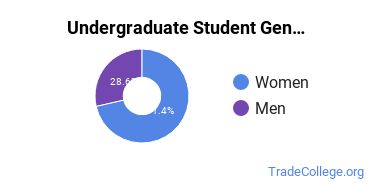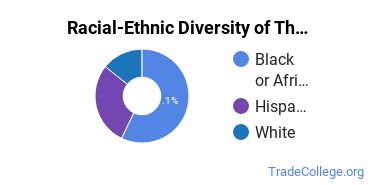Find Trade Colleges
The Workforce Institute’s City College Trade Programs
The Workforce Institute's City College is a private not-for-profit institution located in Philadelphia, Pennsylvania. The location of the school is great for students who enjoy the amenities of city life.
Featured schools near , edit
Where Is The Workforce Institute’s City College?

Contact details for The Workforce Institute's City College are given below.
| Contact Details | |
|---|---|
| Address: | 4322 N. 5Th Street, Philadelphia, PA 19140-2302 |
| Phone: | 215-455-2300 |
| Website: | aspiracitycollege.edu |
Can I Afford The Workforce Institute’s City College?
| In State | Out of State | |
|---|---|---|
| Tuition | $11,997 | $11,997 |
| Fees | $150 | $150 |
| Books and Supplies | $1,203 | $1,203 |
Student Loan Debt
It's not uncommon for college students to take out loans to pay for school. In fact, almost 66% of students nationwide depend at least partially on loans. At The Workforce Institute's City College, approximately 100% of students took out student loans averaging $7,374 a year. That adds up to $29,496 over four years for those students.
The Workforce Institute’s City College Undergraduate Student Diversity
Gender Diversity
Of the 5 full-time undergraduates at The Workforce Institute's City College, 40% are male and 60% are female.

Racial-Ethnic Diversity
The racial-ethnic breakdown of The Workforce Institute's City College students is as follows.

| Race/Ethnicity | Number of Grads |
|---|---|
| Asian | 0 |
| Black or African American | 3 |
| Hispanic or Latino | 1 |
| White | 1 |
| International Students | 0 |
| Other Races/Ethnicities | 0 |
The Workforce Institute’s City College Trade School Concentrations
The table below shows the number of awards for each concentration.
| Major | Associate’s | Undergraduate Certificate | TOTAL |
|---|---|---|---|
| Medical Insurance Specialist/Medical Biller | 0 | 2 | 2 |
| Computer Technology/Computer Systems Technology | 1 | 0 | 1 |
| TOTAL | 1 | 2 | 3 |
References
*The racial-ethnic minorities count is calculated by taking the total number of students and subtracting white students, international students, and students whose race/ethnicity was unknown. This number is then divided by the total number of students at the school to obtain the racial-ethnic minorities percentage.
More about our data sources and methodologies.
